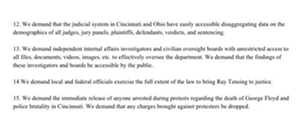Over the past week, thousands of Cincinnatians have joined protests put together by a diverse, often young group of organizers over the Minneapolis police killing of George Floyd and similar incidents.
With all the anger and mourning, suggestions for reforms and new ways of approaching policing have emerged from both younger activists and veteran police accountability advocates who have seen success in pushing reforms in past decades.
Younger Cincinnati organizers who have put together recent George Floyd protests here have released a 15-point set of demands aimed at national and local police reforms.
Local demands include:
- Demilitarization of the Cincinnati Police Department, including a ban on use of assault rifles, armored trucks and other military equipment.
- Reallocation of the Cincinnati Police Department's budget to include much more money for mental health services for officers, increased de-escalation training and more body cameras for officers. All interactions between the public and police should be recorded with either body cameras or dash cameras.
- CPD should create and enforce a no-tolerance policy for use of excessive force.
- The department should increase the number of training hours it takes to become an officer, including 40 hours of cultural awareness courses and 80 hours of de-escalation training.
- Officers should be required to complete a minimum of 80 hours of community service a year in the communities they police.
- Cincinnati Public Schools and local universities should reconsider relationships they have with CPD and take into account input from teachers, students and parents.
- Greater transparency about complaints against Cincinnati police, including a comprehensive count of complaints available on the city's website.
- Release of protesters arrested during George Floyd protests in Cincinnati.
- Efforts by local and federal law enforcement to "bring Ray Tensing to justice." Tensing is the former University of Cincinnati police officer who shot and killed unarmed black motorist Sam DuBose in Mount Auburn in 2015. Multiple juries could not agree on a conviction of Tensing, and the University of Cincinnati later paid Tensing a $250,000 settlement over his termination.
And they're not the only ones with suggestions.
On the steps of City Hall, veteran Cincinnati police accountability activists June 4 introduced their suggestions for reforms to local policing as a full week of protest around police killings continued. Iris Roley, Rev. Damon Lynch III and civil rights attorney Al Gerhardstein of the Black United Front say the suggestions could prevent deaths like Floyd's. The activists were joined by various elected officials and candidates for office.
Some of their proposals are aimed at shoring up the city's Collaborative Agreement — a set of reforms instituted in 2002 in Cincinnati after 15 black residents died during interactions with police, sparking days of civil unrest.
The group also suggested structural changes in the way public safety is funded at the city level. Currently, roughly 70 percent of the city's operating budget goes to public safety. And 36 percent of that operating budget — almost $152 million a year — goes to the police department.
"Seventy percent of the money in this building goes into public safety... and yet we aren't safe," Lynch said. "One of the struggles in this fight is to come into this building and get some of that money we spend and make public safety something that we do for ourselves. We have got to police our own communities. We have to provide our own safety. We cannot trust the police to provide safety for us. We have to figure out how do we wrestle this money that you put in here so that safety becomes a community issue."
That idea is somewhat similar to those floated in other cities. Minneapolis City Council, for example, is mulling a range of suggestions all the way up to disbanding its police force altogether and starting over.
Continued anger swirls over the death of George Floyd, who was killed by Minneapolis police officer Derek Chauvin May 25 after Chauvin held his knee on Floyd's neck for nearly nine minutes.
The protests have also highlighted a number of other deaths of black citizens at the hands of police, including the killing of medical professional Breonna Taylor in Louisville, who was shot to death after police served a no-knock search warrant on her house looking for someone who was not a resident there.
Cincinnati is no stranger to police killings of unarmed black residents. In April 2001, the city witnessed several days of civil unrest due to the killing of unarmed black 19-year-old Timothy Thomas by Cincinnati police officer Stephen Roach.
That killing and the furor over it eventually led to the city's Collaborative Agreement, a police reform effort spearheaded by Roley, Lynch and Gerhardstein.
The Collaborative Agreement sought to shift the Cincinnati Police Department away from aggressive tactics toward more community-oriented policing, created the Citizens Complaint Authority to receive and act upon complaints of officer misconduct or bias, aimed to diversify the city's police force and other efforts.
But an independent review two years ago that was commissioned as part of a refresh of the Collaborative found that the city had effectively walked away from several parts of the agreement. That shouldn't happen, Gerhardstein and others argue.
"Through problem-solving, Cincinnati has cut the number of arrests by 50 percent since the Collaborative went into effect," he said yesterday. "That's a big deal. When you don't arrest people, you don't beat them up. When you don't arrest people, you don't lock them up. That's why it's important to pursue these remedies."
The Black United Front is pushing for six specific reforms:
- Full funding for the Citizens Complaint Authority, an entity created by the Collaborative and designed to independently investigate complaints of police misconduct. "The city and the county have been whittling away at the CCA," Gerhardstein said. "The city cut the funding. Now we don't have a director and we're down two staff. The caseload is too far up. All that has to end. Full funding. Full staff. We have to get the CCA going."
- Better data on arrests and police stops. "We've been saying that we need to know exactly the race of everyone stopped and arrested and the race of every cop who stops and arrests them. We need that on the city's website and we need to stop disparities, which we know exist," he said.
- A problem-solving team for youth disparities in the local juvenile justice system. A CityBeat deep dive into the juvenile justice system here last year found profound racial disparities in arrests and incarcerations among young people in Hamilton County. "There is a huge disparity," Gerhardstein said. "The police are beating up, tasing and arresting blacks at a much higher rate than whites among youth."
- Boost the number of black safety workers including police and fire fighters via a first responders academy at Cincinnati Public Schools. Currently, CPD is roughly 30 percent black, though the city is 45 percent black.
- Robust public input and efforts at dialogue around police abuse and policing disparities. "We ought to be on the street listening to every one of you and every one of your neighbors so we know what you want and so that we make it happen in any rejuvenated agreement. We have to have something that represents people in the community."
- Prioritizing a refresh of the Collaborative Agreement. That refresh has "been on the backburner," Gerhardstein said.
An independent review preceding the refresh efforts in November 2017 found that the "City of Cincinnati has unilaterally withdrawn from the Collaborative Agreement," though the city has taken issue with that finding.
Several Cincinnati City Council members have expressed support for the recommendations and they, along with other suggestions, could come before full council soon.
But council member Greg Landsman said that change won't come from council alone.
"It is going to take an army," Landsman said. "It is systemic. It is not going to be one person. It's not going to be a mayor or a couple council members or even a police chief. It is going to require an army of people who stick together every day for the next five to 10 to 20 years until it is changed."
Of course, not everyone is sold on the reform approach. A few protesters at yesterday's event by the Black United Front expressed impatience with the pace of change that has happened.
"If what y'all were doing had changed the narrative, George Floyd would be alive right now," one man yelled. "This is not just a Cincinnati issue. It's a worldwide issue. You all are talking about Cincinnati politics."
One other protester also skeptical of the reform efforts on offer had a very specific change he wanted to see: the cessation of arrests for those suspected in non-violent offenses. Landsman said that is something he could introduce into city council.
Many in the crowd were supportive of the Black United Front and cheered the suggestions. Roley encouraged younger protesters to build on what the group accomplished while acknowledging change hasn't come fast enough.
"I have a 26-year-old, a 34-year-old and a 40-year-old black male son," she said to the man who questioned the reforms already undertaken. "It doesn't get greater than that. Your pain is no different than mine. You don't get to step on our sacrifice. Please listen to what we've assembled today so that we're not bamboozled and hoodwinked. So that you can learn from our mistakes, so you can do better than what we did. I apologize to you all that we didn't make it greater and better and that we still have to be out on the streets."
There are deeper issues that their recommendations don't address tied to racial disparities in economic issues, the group acknowledged.
"Before George Floyd and Ahmaud Arbery and Breonna Taylor, we were already suffering," Lynch said. "We already had one of the highest poverty rates in the nation. In a city where you've got Procter & Gamble, Kroger, Macy's, and all of that power and money, our communities are starving. You've got communities with no grocery stores and the largest grocery company in the world is headquartered in your city."
That's a lesson police reform advocates learned two decades ago.
"When the marches are over and the protest is over, we can't disappear," Lynch continued. "Twenty years ago we did this. We marched through Over-the-Rhine, marched downtown, confronted the cops, got the Collaborative Agreement. And you know what? We got the agreement, and they got Over-the-Rhine. They displaced the people. Now, the places where the people I used to pastor lived are million-dollar condos and sushi bars."
Mass Action for Black Liberation, the group once known as Cincinnati Black Lives Matter that organized many protests around police killings earlier this decade, released its own set of demands June 8.They include:
• Defunding and demilitarization of the Cincinnati Police Department
• Replacing police response to wellness checks and domestic violence calls with a wraparound social work response,
• Fully funding the Citizen’s Complaint Authority
• Eliminating racial disparity in the criminal-legal system including in arrests, convictions, and sentencing.
• Reallocating money spent on police for social programs including the affordable housing trust fund
• Providing reparations to families of victims of police violence.
• Initiating or reopening criminal cases of police brutality/police killings.
• Investing in cooperatively owned, Black led economic initiatives.
• Protecting and expanding current investment in community-led health, education, and safety strategies.
• Cincinnati Public School District immediately removing all Cincinnati police officers from our schools and ceasing all contracts with CPD.
You can read the full list of recommendations, posted to the Ohio Justice & Policy Center at ohiojpc.org.
And here is the full list of 15 recommendations from younger Cincinnati organizers:








